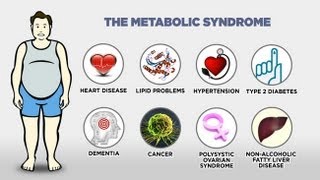The Skinny On Obesity – UCTV
Back in 2009, a doctor named Robert Lustig was the first to put himself out on a professional limb and say we have problems with sugar in a Youtube video called Sugar: The Bitter Truth. It was a very long lecture using a lot of science terms that probably scared away half the audience out of fear of learning something hard and scared the other half numb with incredulity. In the original video he says that sugar (fructose especially) is the toxin that is causing our obesity epidemic.
 Because the video has been viewed over 2.75 million times at the time of this writing, I can only imagine that University of California saw a need to make the information a little more accessible to a high-school level education. Hence, a new educational youtube ‘course’ called ‘The Skinny on Obesity‘. Dr. Lustig is a fully credentialled medical doctor who specializes in the metabolism of sugars at the molecular level, so when he talks, there is academic gravitas behind what he says. And he says it compellingly. Check it out.
Because the video has been viewed over 2.75 million times at the time of this writing, I can only imagine that University of California saw a need to make the information a little more accessible to a high-school level education. Hence, a new educational youtube ‘course’ called ‘The Skinny on Obesity‘. Dr. Lustig is a fully credentialled medical doctor who specializes in the metabolism of sugars at the molecular level, so when he talks, there is academic gravitas behind what he says. And he says it compellingly. Check it out.
But I suspect there’s more involved than just sugar, and that’s addressed in a couple other videos put out by BBC Horizon with Michael Mosley, a journalist with a passion for learning about making our bodies healthier. He did two great videos: The Truth About Exercise and Eat, Fast and Live Longer.
In the first video about exercise, he talks about how important it is to exercise, but that science suggests that there is a sweet spot in duration, repetition and intensity for each individual and that bulk of humans will benefit the most from a minimum of exercise. Many of us do not benefit from over-exercising.
The second video (consecutively) deals with metabolism and fasting. He tries three different methods of fasting because he learns that a modicum of fasting actually increases life span of all animal life. Part of the reason why this is so is because during the period when we are fasting, the body goes through a repair cycle – cell regeneration and cancer fighting happen best when we fast. It also gives the liver a chance to relax from its job as the main toxin filter. When there is little or no glycogen left in the liver, the body starts metabolising fat. That actually may be a good thing. Our ancestors did not have the very steady meals we do. They ate when food was available. And went without when it wasn’t. Our bodies are predisposed to take advantage of periods without food.
So maybe when you combine the three considerations you get this: Fructose is a toxin, but the liver is the only organ in the body that metabolizes it. We have to give it a break, sometimes. Limited fasting allows this. And it’s not like we’re starving ourselves here, because the goal is not to lose weight necessarily but to give the liver a break. I wonder if people who don’t benefit from huge amounts of exhaustive exercise might benefit from hard exercise sometime either before or after fasting. A combined fast/exercise/feast vs. feast/exercise/fast study might produce better details on whether or not those of us humans who don’t benefit from lots of exercise couldn’t be pushed to more athletic prowess by different combinations of the moderate diet, exercise and fasting. Food for thought…



